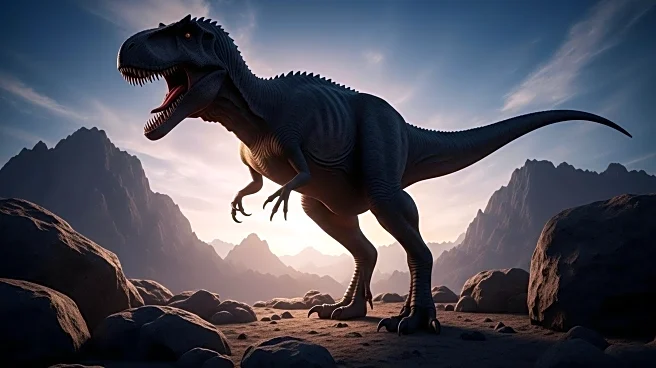What's Happening?
A newly identified species of meat-eating dinosaur, Joaquinraptor casali, has been discovered in Argentina, providing new insights into the megaraptorans, a group of Cretaceous Period predators. The fossil, found in Patagonia, includes extensive skull remains and the leg of a crocodile relative, suggesting the dinosaur may have died while eating the croc. Joaquinraptor, measuring about 23 feet long and weighing one ton, was an apex predator in its ecosystem. The discovery sheds light on the anatomy and behavior of megaraptorans, which were previously poorly understood due to incomplete fossil records.
Why It's Important?
The discovery of Joaquinraptor is significant as it enhances understanding of megaraptorans, a group of dinosaurs that thrived until the end of the dinosaur age. This finding provides crucial information about their physical characteristics, diet, and ecological role. The preserved skull offers insights into the evolutionary adaptations of these predators, contrasting with other known species like Tyrannosaurus rex. Understanding these differences helps paleontologists piece together the diverse evolutionary pathways of predatory dinosaurs during the Cretaceous Period.
What's Next?
Further analysis of the Joaquinraptor fossil may reveal more about its diet and behavior, potentially offering clues about the ecological dynamics of its habitat. Researchers may continue to explore the evolutionary relationship between megaraptorans and other predatory dinosaurs, aiming to understand why different lineages developed distinct adaptations. Continued excavation in Patagonia could uncover additional fossils, providing more comprehensive insights into the region's prehistoric biodiversity.
Beyond the Headlines
The discovery of Joaquinraptor highlights the importance of paleontological research in understanding prehistoric ecosystems and evolutionary biology. It underscores the complexity of predator-prey interactions and the diverse strategies employed by different species to survive. This research contributes to broader scientific knowledge about the history of life on Earth and the factors that influence species evolution.










